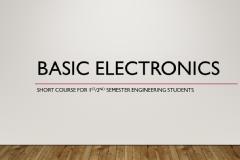The class will cover the following topics of molecular biology for Btech Biotechnology Engineering students.
1. Nucleic acid structure: Nucleotides and nucleic acids, DNA structure, different forms of DNA, unusual DNA structure, different types of RNA, RNA structure. [3] 2. Nucleic acid chemistry: Denaturation and renaturation, hybridization, nonenzymatic transformation (Mutation) – spontaneous and induced, point mutation - transition, transversion, mutation involving more than one base pairs, insertion, deletion, frame shift mutation, forward and back mutation, null mutation, Loss-of-function and gain-of-function mutation, silent mutation, DNA sequencing. [4] 3. Chromosome organization: Chromosomal elements – genes and intergenic regions, regulatory sequences; DNA supercoiling, linking number, Chromosome structure: Histones, Non-histones, Nucleosome, Chromatin. Chromosome structure in prokaryotes & eukaryotes. [4] 4. DNA replication and repair: Central dogma, DNA replication in prokaryots and eukaryots – set of fundamental rules, DNA polymerases, proteins and enzymes involved in replication, process, accuracy. [4] 5. Transcription and post-transcriptional processing: DNA-dependent RNA synthesis in prokaryotes and eukaryotes, RNA polymerases, transcription process, termination, selective inhibition, RNA processing – capping, splicing of introns, differential RNA processing; RNA-dependent synthesis of RNA and DNA. [4] 6. Protein synthesis – translation: Genetic code, ribosome, transfer RNA, protein biosynthesis stages – attachment of amino acid to specific tRNA, initiation, elongation, termination, folding and processing; inhibition of protein synthesis. [4] 7. DNA repair: DNA repair – multiple repair systems. [3] 8. Regulation of gene expression: Regulation of gene expression in bacteria - operon concept; Regulation of gene expression in eukaryotes, hormonal control of gene expression in eukaryotes. [3] 9. Introduction to recombinant DNA and Gene Cloning Tools of recombinant DNA: Vectors; plasmid, bacteriophage viral vectors, cosmids, yeast artificial chromosome. Expression vectors, and selection of suitable Host. [5] 10. Restriction endonucleases and other enzymes use and mechanism of action and analysis, Genomic DNA and cDNA library preparation. Strategies for engineered vectors use and regulation for enhanced gene expression and purification. [5] 11. Screening and selection of clone with desired gene and protein of interest: Colony and plaque hybridization. antibody based assay, Protein activity. Application of gene cloning and DNA Analysis. [3] 12. Molecular probes: Preparation of molecular probes DNA probes, RNA probes, radioactive labeling, Non-radioactive labeling, use of molecular probes in DNA fingerprinting. Southern blotting, Northern blotting, Western blotting, In-situ hybridization. [4] 13. MOLECULAR TECHNIQES: Polymerase chain reaction, different types and their use. Antisense RNA technology, Site directed mutagenesis, Use of RFLP, SNP and Microarray. [4]





